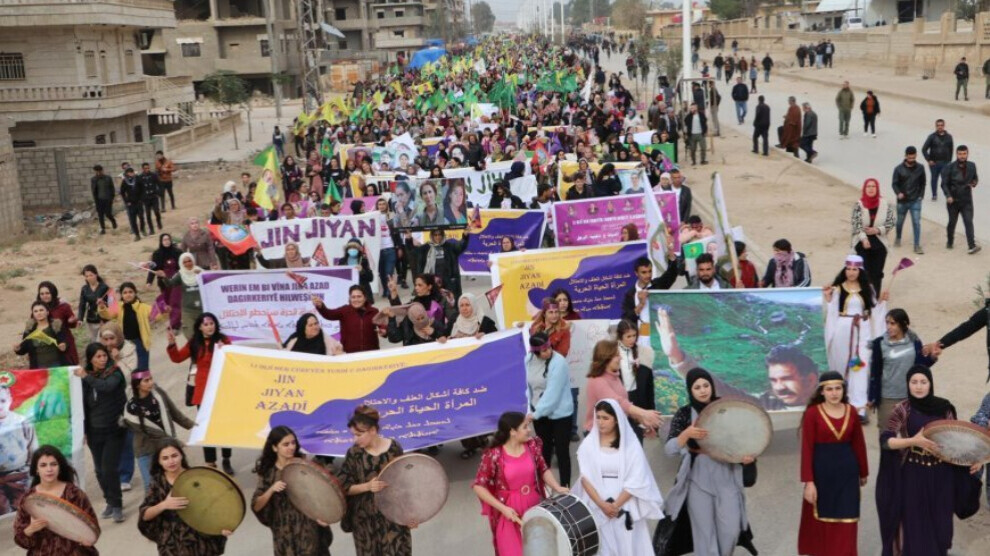Issued on: 20/03/2021 -

Text by: NEWS WIRES|
Video by: Sanam SHANTYAE
Thousands protested in Turkey on Saturday calling for President Recep Tayyip Erdogan to reverse his decision to withdraw from the world's first binding treaty to prevent and combat violence against women.
Erdogan’s overnight decree annulling Turkey’s ratification of the Istanbul Convention is a blow to women’s rights advocates, who say the agreement is crucial to combating domestic violence. Hundreds of women gathered in Istanbul to protest against the move on Saturday.
The Council of Europe's Secretary General, Marija Pejčinović Burić, called the decision "devastating."
“This move is a huge setback to these efforts and all the more deplorable because it compromises the protection of women in Turkey, across Europe and beyond,” she said.

04:17
The Istanbul Convention states that men and women have equal rights and obliges state authorities to take steps to prevent gender-based violence against women, protect victims and prosecute perpetrators.
Some officials from Erdogan’s Islam-oriented party had advocated for a review of the agreement, arguing it is inconsistent with Turkey's conservative values by encouraging divorce and undermining the traditional family unit.
Critics also claim the treaty promotes homosexuality through the use of categories like gender, sexual orientation and gender identity. They see that as a threat to Turkish families. Hate speech has been on the rise in Turkey, including the interior minister who described LGBT people as “perverts” in a tweet. Erdogan has rejected their existence altogether.
Women’s groups and their allies who have been protesting to keep the convention intact immediately called for demonstrations across the country Saturday under the slogan “Withdraw the decision, implement the treaty.” They said their years-long struggle would not be erased in one night.
Rights groups say violence against and killing of women is on the rise in Turkey but the interior minister called that a “complete lie” on Saturday.
77 women killed since start of the year
A total of 77 women have been killed since the start of the year, according to the We Will Stop Femicide Platform. Some 409 women were killed in 2020, with dozens found dead under suspicious circumstances, according to the group.
Numerous women's rights groups slammed the decision. Advocacy group Women's Coalition Turkey said the withdrawal from a human rights agreement was a first in Turkey. “It is clear that this decision will further encourage the murderers of women, harassers, rapists,” their statement said.
Turkey's justice minister said the government was committed to combating violence against women.
“We continue to protect our people's honor, the family and our social fabric with determination," Justice Minister Abdulhamit Gul tweeted.
Erdogan has repeatedly stressed the “holiness” of the family and called on women to have three children. His communications director, Fahrettin Altun, said the government's motto was ‘Powerful Families, Powerful Society."
Many women suffer physical or sexual violence at the hands of their husbands or partners, but up-to-date official statistics are unavailable. The Istanbul Convention requires states to collect data.
Hundreds of women and allies gathered in Istanbul, wearing masks and holding banners. Their demonstration has so far been allowed but the area was surrounded by police and a coronavirus curfew begins in the evening.
They shouted pro-LGBT slogans and called for Erdogan's resignation. They cheered as a woman speaking through a megaphone said, “You cannot close up millions of women in their homes. You cannot erase them from the streets and the squares.”
Turkey was the first country to sign the Council of Europe’s “Convention on preventing and combating violence against women and domestic violence” at a committee of ministers meeting in Istanbul in 2011. The law came into force in 2014 and Turkey's constitution says international agreements have the force of law.
Some lawyers claimed Saturday that the treaty is still active, arguing the president cannot withdraw from it without the approval of parliament, which ratified the Istanbul Convention in 2012.
But Erdogan gained sweeping powers with his re-election in 2018, setting in motion Turkey changing from a parliamentary system of government to an executive presidency.
The justice minister wrote on Twitter that while parliament approves treaties which the executive branch puts into effect, the executive also has the authority to withdraw from them.
Women lawmakers from Turkey’s main opposition party said they will not recognize the decree and called it another “coup” on parliament, which had unanimously accepted the treaty, and a usurpation of the rights of 42 million women.
(AP)
Protests erupted in Turkey after President Erdogan decided to pull out of the landmark international convention which aims to protect women from violence

Erdogan's move prompted an outcry from activists
President Recep Tayyip Erdogan has triggered nationwide protests for withdrawing Turkey from an international agreement to prevent violence against women.
The decision comes amid increasing calls in Turkey to combat domestic violence as femicide rates rise.
Turkish officials argue that national regulations are enough to ensure protection against gendered violence.
"The guarantee of women's rights are the current regulations in our bylaws, primarily our Constitution. Our judicial system is dynamic and strong enough to implement new regulations as needed," Family, Labour and Social Policies Minister Zehra Zumrut Selcuk said on Twitter.
How are women's rights groups responding today?
Women's rights activists reacted with dismay and called for street marches.
"I’m utterly appalled to learn that tonight Turkish government has officially announced they are withdrawing from Istanbul Convention. This in a country where three women are killed daily and femicide is a huge crisis," prominent Turkish author Elif Shafak wrote on Twitter.
Reporting from a rally in Istanbul, DW's Julia Hahn said many women responded to the decision with "anger and outrage."
Last year, senior politicians in Erdogan's conservative party, the AKP, "started arguing that this convention encourages immoral lifestyles like homosexuality. They were met with massive protests by women at the time," Hahn said.
But now "Erdogan has bowed in to pressure from hardliners in his coalition," Hahn continued, noting that the Turkish president is trying to use this issue "to re-energize his voter base amidst a period of economic downturn," she said.
Watch video 03:02 DW’s Julia Hahn reports from protest rally in Istanbul
As thousands rally across the nation today, organizers are expecting more protests in the next days and weeks to come, she added.
"Since even conservative women are in favor of the convention, there must be some kind of political rational from President Erdogan to come up with this decision at this time," reported Hahn
What is the Istanbul Convention?
The 2011 agreement, commonly referred to as the Istanbul Convention, was drafted by the Council of Europe in the Turkish city in 2011. It is a legal framework seeking to protect women and promote gender equality through legislation, education and spreading awareness.
According to the accord, signatories had to "take the necessary legislative and other measures to adopt and implement state-wide effective, comprehensive and coordinated policies encompassing all relevant measures" to prevent violence against women.
The convention was signed by 45 European countries, plus the EU as an institution.
Some conservatives in Turkey say the deal threatens family structures and promotes homosexuality, citing its principle of non-discrimination on the grounds of sexual orientation.
What is the situation for women in Turkey?
Women's rights groups had said Turkish authorities were not applying the legal norms of the Istanbul Convention nor providing the intended assistance and protective measures for women.
Watch video 05:00 Turkey: Violence against women
Activists also said the pullout was pushing Ankara further from aligning with the European Union's values, which Turkey remains a candidate to join.
At least 38% of women in Turkey are subject to domestic violence, according to the World Health Organization. The 'We Will Stop Femicide' platform reported 300 femicides in Turkey in 2020.
Hundreds of thousands of women had downloaded a smartphone app that Turkey created for them to report domestic violence, according to a Reuters report.
mb/dj (dpa, Reuters)
3/19/2021
ANKARA (Reuters) - President Tayyip Erdogan pulled Turkey out of an international accord designed to protect women, the country's official gazette said on Saturday, despite calls from campaigners who see the pact as key to combating rising domestic violence.

The Council of Europe accord, forged in Istanbul, pledged to prevent, prosecute and eliminate domestic violence and promote equality. Turkey, which signed the accord in 2011, saw a rise in femicides last year.
No reason was provided for the withdrawal, but officials in Erdogan's ruling AK Party had said last year the government was considering pulling out amid a row over how to curb growing violence against women.
"The guarantee of women's rights are the current regulations in our bylaws, primarily our Constitution. Our judicial system is dynamic and strong enough to implement new regulations as needed," Family, Labour and Social Policies Minister Zehra Zumrut said on Twitter, without providing a reason for the move.
Many conservatives in Turkey say the pact undermines family structures, encouraging violence. They are also hostile to the principle of gender equality in the Istanbul Convention and see it as promoting homosexuality, given its principle of non-discrimination on grounds of sexual orientation.
Critics of the withdrawal from the pact have said it would put Turkey further out of step with the values of the European Union, which it remains a candidate to join. They argue the deal, and legislation approved in its wake, need to be implemented more stringently.
Turkey is not the first country to move towards ditching the accord. Poland's highest court scrutinised the pact after a cabinet member said Warsaw should quit the treaty which the nationalist government considers too liberal.
Erdogan has condemned violence against women, including saying this month that his government would work to eradicate violence against women. But critics say his government has not done enough to prevent femicides and domestic violence.
Turkey does not keep official statistics on femicide. World Health Organization data has shown 38% of women in Turkey are subject to violence from a partner in their lifetime, compared to about 25% in Europe.
Ankara has taken measures such as tagging individuals known to resort to violence and creating a smartphone app for women to alert police, which has been downloaded hundreds of thousands of times.
Erdogan's decision comes after he unveiled judicial reforms this month that he said would improve rights and freedoms, and help meet EU standards. Turkey has been a candidate to join the bloc since 2005, but access talks have been halted over policy differences and Ankara's record on human rights.
(Reporting by Tuvan Gumrukcu; Editing by Jane Wardell and William Mallard)








